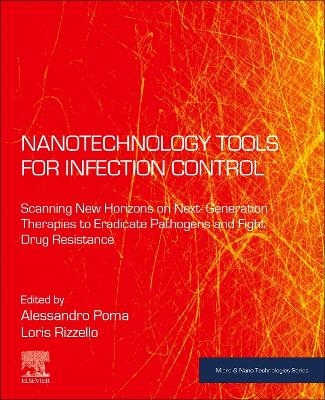
Nanotechnology Tools for Infection Control
Elsevier Science Publishing Co Inc (Verlag)
978-0-12-823994-0 (ISBN)
Alessandro Poma received his MSc in Pharmaceutical Technology and Chemistry from the University of Palermo (Italy) in 2009. He then joined the Cranfield Biotechnology Group led by Prof. Sergey Piletsky to undertake a PhD in Biosensors and Nanomaterials (Cranfield University, 2013). He moved to UCL in 2014, first as an NC3Rs David Sainsbury Fellow and subsequently in other roles, and he has been appointed Lecturer in Biomaterials and Allied Subjects in the Division of Biomaterials and Tissue Engineering in 2019. His key research area is the development of molecularly imprinted nanomaterials as synthetic antibodies, and their polymeric biodegradable composites for diagnostic, therapeutic and tissue engineering applications Loris Rizzello received his MSc (Magna cum Laude) in Biotechnology at the University of Salento (Italy) in 2008, and the PhD in nanoscience at the Italian institute of Technology (IIT) in 2012. He then joined the University College London (UCL), Department of Chemistry, as International Newton Postdoctoral Fellow (by The Royal Society) under the supervision of Prof. Giuseppe Battaglia. He moved to the Institute for Bioengineering of Catalonia (IBEC) of Barcelona as a Marie Curie Fellow in 2018. He has been appointed as Associate Professor of Protein Engineering and ERC-StG grantee at the University of Milan, Department of Pharmaceutical Science, since October 2020. From March 2021, he is also Junior Group Leader at National Institute of Molecular Genetics of Milan (INGM), where he leads the Infection Dynamics Laboratory. His key research area is the use of cell-derived biomimetic nanoparticles for the treatment of intracellular pathogens infections, with a focus on the eradication of human tuberculosis. He also investigates the innate and adaptive immune response to Mycobacteria infections.
1. Introduction
2. The significant drain in antimicrobial discovery by pharma companies
3. Design and production of nanoparticles
4. Nanoparticles characterisation and standardisation
5. Navigating the nanoscale: principles of body navigation
6. Intracellular fate of nanosystems, their degradation and body accumulation
7. Molecular targets and pharmacodynamics for bactericidal and bacteriostatic activity
8. How to fight bacteria without inducing drug resistance
9. Pre-clinical characterisation: which animal model is best for infection?
10. Clinical translation and envisioned impact of nanotech for infection control: economy, government policy and public awareness
| Erscheinungsdatum | 03.09.2024 |
|---|---|
| Reihe/Serie | Micro & Nano Technologies |
| Sprache | englisch |
| Maße | 191 x 235 mm |
| Gewicht | 450 g |
| Themenwelt | Studium ► Querschnittsbereiche ► Infektiologie / Immunologie |
| Technik ► Maschinenbau | |
| ISBN-10 | 0-12-823994-8 / 0128239948 |
| ISBN-13 | 978-0-12-823994-0 / 9780128239940 |
| Zustand | Neuware |
| Informationen gemäß Produktsicherheitsverordnung (GPSR) | |
| Haben Sie eine Frage zum Produkt? |
aus dem Bereich


